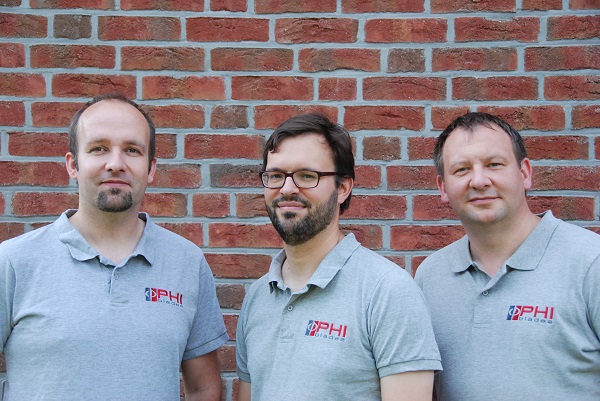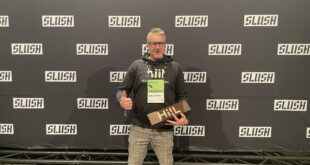PHI Blades is a Hamburg-based startup working to improve wind turbines by redesigning the rotor blades.
Rotor blades can be expensive, and don’t necessarily last a long time as they are constantly exposed to the elements. PHI Blades solution is remarkably simple: they have developed a rotor blade made entirely of wood.
The founders recently participated in speed-dating with investors at the startup #Pitchdeck at the Reeperbahn Festival in Hamburg and found themselves answering the same question over and over again: “Why would this work?”
Traditionally, wind turbines are made of man-made components, so it was easy for people to be dismissive of PHI Blade’s concept. But as CEO Phillip von Gertzen points out, “Why would this not work?”
From why to why not
Co-founders Nicolas Hoyer and Gregor Prass are veterans of the wind-energy industry. They had previously worked as managing director and consultant, respectively, at the company TimberTower, which had successfully developed wooden towers for wind turbines.
As Phillip von Gartzen explains, “Nicolas and Gregor had been confronted with the statement that towers can be made out of wood, but for all other components, especially the blades, it was not possible. However, no one could give proof as to why it is not possible.”
Both began to research the concept further, and could not find any grounds for such a statement. They came across a Master’s thesis written by Rasmus Borrmann at the Wind Energy Technology Institute (WETI) at the Flensburg University of Applied Sciences (FH Flensburg) confirming the general feasibility that even very large blades could be made out of wood.
German hardware and Danish software
Through WETI, they discovered research and software in this niche was being produced at a high level at the Technical University of Denmark (DTU). PHI Blades ultimately chose to use core tools that were developed at DTU as the basis of their blade development. This includes the software BECAS , which is used to model wind turbine blades, and can handle the complex geometries of such structures efficiently.
“The initial contract was established by our WETI partners, who decided to use [DTU] software. After seeing the results and agreeing on a similar workflow within our company, we licensed BECAS as one of our core tools for our blade development,” says von Gartzen.
BECAS was developed at DTU primarily by José Pedro Albergaria Amaral Blasques and Robert Bitsche.
“If you look at modern windmills, they have long blades. We look at two things when we design them: to make sure that the blades rotate – and so can transform the energy of the wind into electrical energy – and that they do not break. We created a software that designs both the inside and outside structures of the blade to make them resistant and efficient,” says Blasques.
BECAS has been commercialized to manufactures since 2012. Academically, it has been a huge success, as many PhD students use the software. Industry-wide, BECAS can be used across a few industries, including for rotor blade design in helicopters. However, PHI Blades is the first startup that has used BECAS for an innovative purpose.
Where it reads: Industry-wide, BECAS can be used across many different industries, including for rotor blade design in helicopters. However, PHI Blades is the first startup that has used BECAS.
“Usually we get contacted by big companies. PHI Blades has been the first ever startup company to contact us. They started with a two months trial license and then bought the software,” says Blasques.
PHI Blades CEO von Gertzen says collaborating with DTU has been a seamless process, because they both share the same motivations: to solve problems with efficient and practical solutions, and share the products on a commercial basis.
An industry moving rapidly – in many directions
The renewable energy industry has changed drastically over the last few decades. As Blasques explains, “You never really solve a problem and you never really run out of ideas. Time brings up new challenges and directs focus in different directions.”
So what is the focus now? According to Blasques, the focus is actually right in line with PHI Blades’ goals.
“Now, there is more focus on the accuracy of calculations on how the blades will behave. What the market wants now is a more accurate prediction. It allows you to have a lower cost of energy, as blades can, for example, be lighter, so there are less production costs involved.”
In the last few years, there have been unprecedented possibilities to explore new designs, materials, and shapes in wind turbines. While the DTU team focuses on developing the best possible predictability through its software, PHI blades takes on the challenge from the material side.
By combining their expertise, DTU and PHI blades are able to create an eco-friendly, economical, and competitive blade. As von Gertzen explains:
“Our blades are 30% less expensive and are designed to last for more than 25 years. That might sound simple, but is a major improvement in blade technology. Also quality issues arise in the industry. Many quality issues can be traced back to the material that is used. Glass fiber reinforced plastics (GFRP) is the dominating material for rotor blades. Within the last years there has been many innovations in wood manufacturing and processing that have made wood to a very attractive material”.
At the moment, Phi Blades is currently developing their first prototype, which will have a length of 25 meters. Over the next three years, they plan to develop, manufacture, and bring into service a total of three different prototypes, with an initial target market of wind turbines that require blades of 60 meters or more.
By the beginning of the year they will start a second financing round and are already looking for potential investors.
Photo courtesy of UnitedNetworker.
 Nordic Startup News Early Stage Startup News From The Nordics
Nordic Startup News Early Stage Startup News From The Nordics


